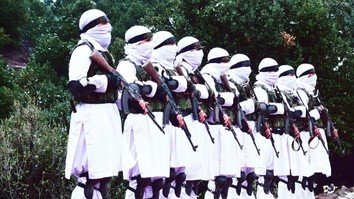HERAT -- The Taliban and al-Qaeda are working together to fight Afghan security forces in Nimroz Province -- a breach of the Taliban's peace agreement with the United States and an indication of their insincerity about holding intra-Afghan talks and ending the war, local officials and analysts say.
"Two hundred al-Qaeda fighters are Taliban allies, and they fight alongside them in Nimroz Province against the security forces," Nimroz Governor Sayed Wali Sultan said July 28.
Some of the complex terrorist attacks the Taliban undertake are hard for them to spearhead, and in reality al-Qaeda plans them, he said.
"Al-Qaeda helps the Taliban use advanced tactics and carry out terrorist attacks," he said.
The Afghan National Defence and Security Forces (ANDSF) have launched "multiple attacks ... on joint bases of the Taliban and al-Qaeda", Sultan said. "Al-Qaeda fighters have been killed along with those of the Taliban during these military operations."
Taliban, al-Qaeda inseparable
"It is clear that al-Qaeda and other terrorist groups operate alongside the Taliban in Afghanistan, and they have been fighting against the Afghan security and international coalition forces for years," said Mohammad Naim Ghayur, a military affairs analyst in Herat city.
Because of the Taliban's presence and operations, many mountainous and remote areas of Afghanistan have become safe havens for terrorist groups such as al-Qaeda, and these groups potentially threaten all countries, he said.
"The Taliban never want to lose this supporter, and therefore, they maintain close relations with al-Qaeda and collaborate with it," he said.
"As the war continues and as the Taliban use advanced military equipment and carry out complex terrorist attacks, its shows that the Taliban have foreign supporters, and in most cases al-Qaeda and some foreign intelligence agencies spearhead and lead these clashes of the Taliban," Ghayur said.
"The Taliban haven't been able to prove that they have severed their relations with al-Qaeda," said Muhammad Sardar Bahaduri, a member of the Herat Provincial Council.
"If the Taliban had cut their relations with al-Qaeda and other terrorist groups, the number of violent incidents and of terrorist attacks would have decreased in Afghanistan."
"Al-Qaeda and certain foreign intelligence agencies have always helped the Taliban to plan, execute and manage their terrorist attacks," he said. "Al-Qaeda still provides financial and military support to the Taliban as both these groups have very close relations."
Serious threat to global security
If the Taliban regain power, their relations with al-Qaeda and other terrorist groups will become stronger, analysts warn.
"Countries that are involved in Afghanistan must take preventive measures against the al-Qaeda network and other allies of the Taliban," said Abdul Qader Kamel, a political analyst in Herat city.
"If the core of al-Qaeda is not destroyed and the Taliban don't end their relations with al-Qaeda and other terrorist groups, events that are bloodier than 9/11 will occur," he said.
The killing of Asim Umar, leader of Al-Qaeda in the Indian Subcontinent (AQIS), along with 22 Taliban fighters last September in Musa Qala District, Helmand Province, underscores "that the Taliban and al-Qaeda are fighting from the same front", Kamel said.
Al-Qaeda leads and manages the Taliban's war in many of the provinces, which is a matter of concern, he said.
"The Taliban have promised the United States in their agreement that they would break ties with al-Qaeda and other terrorist groups," Kamel said.
"But it seems that the Taliban don't deliver on their promises as they have retained their ties with al-Qaeda, the Haqqani Network, Lashkar-e-Taiba, Jaish-e-Muhammad, Jamaat-ud-Dawa, Lashkar-e-Jhangvi, Jundullah, the Islamic Movement of Uzbekistan, East Turkestan Islamic Movement, Chechen fighters and ... Katibat al-Imam al-Bukhari [also known as Imam Bukhari Jamaat]", he said.

![Afghan National Army (ANA) soldiers escort Taliban prisoners during their release from Bagram Prison on May 26. The Taliban and al-Qaeda are maintaining relations in breach of a peace agreement between the militants and the United States, say officials in Nimroz. [Wakil Kohsar/AFP]](/cnmi_st/images/2020/08/06/25361-000_1sb4ni-585_329.jpg)







Al-Qaeda is of the founder of Taliban. Al-Qaeda created Mujahedeen during the communist regime and then Taliban to establish an Islamic system in Afghanistan, but Mujahedeen were later misled and again had contact with Russia, and now Taliban have ties with the United States. Al-Qaeda may not support Taliban in the future.
Reply1 Comment